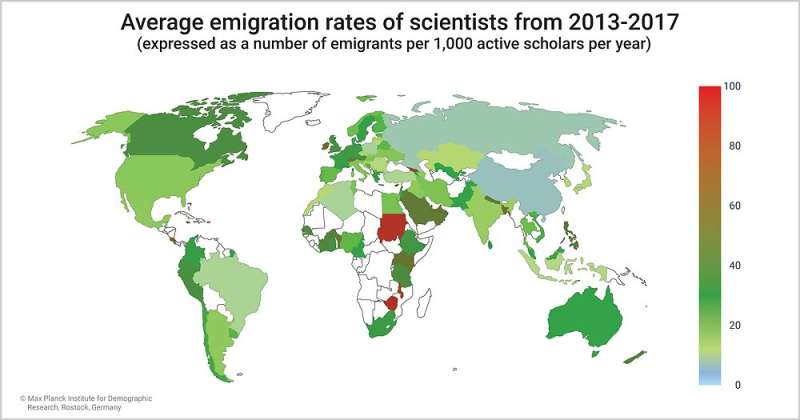This article has been reviewed according to Science X's editorial process and policies. Editors have highlighted the following attributes while ensuring the content's credibility:
fact-checked
peer-reviewed publication
trusted source
proofread
Migration of academics: Economic development does not necessarily lead to brain drain

A team of researchers at the Max Planck Institute for Demographic Research (MPIDR) in Rostock, Germany, developed a database on international migration of academics in order to assess emigration patterns and trends for this key group of innovators. Their paper was published in PNAS on Jan. 18.
As a first step, the team produced a database that contains the number of academics who publish papers regularly, and migration flows and migration rates for all countries that include academics who published papers listed on the bibliographic database Scopus. The migration database was obtained by leveraging metadata of more than 36 million journal articles and reviews published from 1996 to 2021.
"This migration database is a major resource to advance our understanding of the migration of academics," says MPIDR Researcher Ebru Sanliturk. Data Scientist Maciej Danko adds: "While the underlying data are proprietary, our approach generates anonymized aggregate-level datasets that can be shared for noncommercial purposes and that we are making publicly available for scientific research."
MPIDR Researcher Aliakbar Akbaritabar explains how they processed the bibliographic data in order to receive information about the migration patterns of academics: "We used the metadata of the article title, name of the authors and affiliations of almost every article and review published in Scopus since 1996. We followed every single one of the roughly 17 million researchers listed in the bibliographic database through the years and noticed changes in affiliation and, by using that tactic we know how many academics left a given country every year."
The researchers' empirical analysis focused on the relationship between emigration and economic development, indicating that academic setting patterns may differ widely from population-level ones.
Previous literature has shown that, as low-income countries become richer, overall emigration rates initially rise. At a certain point the increase slows down and the trend reverses, with emigration rates declining.
This means that favoring economic development has the counterintuitive effect of initially increasing migration from low- and middle-income countries, rather than decreasing it.
Is this pattern also generally valid for migration of scientists?
Not really.
The researchers found that, when considering academics, the pattern is the opposite: in low- and middle-income countries, emigration rates decrease as the gross domestic product (GDP) per capita increases. Then, starting from around 25,000 US Dollars in GDP, the trend reverses and emigration propensity increases as countries get richer.
MPIDR Director Emilio Zagheni adds, "Academics are a crucial group of innovators whose work has relevant economic effects. We showed that their propensity to emigrate does not immediately increase with economic development—indeed it decreases until a high-income turning point and then increases. This implies that increasing economic development does not necessarily lead to an academic brain drain in low- and middle-income countries."
Unveiling these and related patterns, and addressing big scientific questions with societal implications, was possible only because of painstaking work in preparing this new global database of migration of academics. "We are putting the final touches on an even more comprehensive database, the Scholarly Migration Database, which will be released on its own website soon," says software developer Tom Theile.
More information: Ebru Sanliturk et al, Global patterns of migration of scholars with economic development, Proceedings of the National Academy of Sciences (2023). DOI: 10.1073/pnas.2217937120
Journal information: Proceedings of the National Academy of Sciences
Provided by Max Planck Society





















